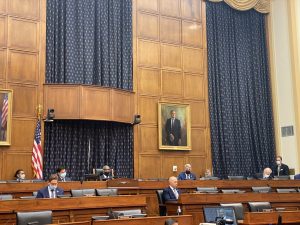McCaul: “We Cannot Allow Afghanistan to be Another Saigon”
Washington, DC – House Foreign Affairs Committee Lead Republican Michael McCaul delivered the following opening statement at a full committee hearing examining the U.S.-Afghanistan relationship following the military withdrawal.
“And finally, we have an obligation to thousands of Afghans who put themselves in danger to work with and for our military and our diplomats and our special operators. We made commitments to them to issue Special Immigrant Visas to these qualifying heroes for their service to our troops in country…We cannot allow Afghanistan to be another Saigon. This isn’t just about the people waiting for these visas in Afghanistan. If our allies and partners don’t trust us to keep our word or think they will be abandoned, it could cause irreparable damage to our national security.”
-Opening Remarks as Delivered-
“Thank you, Mr. Chairman. I think we share the same concerns as you articulately laid out.
Zal, it is great to see you again. Maybe you haven’t appeared in this setting, we’ve certainly met with you many times in classified and private meetings and I just want to thank you for your service to the nation. It’s not an easy task to negotiate with the Taliban. In fact I can’t imagine what that is like.
Last month, President Biden announced all U.S. troops would withdraw from Afghanistan by September the 11th of this year – the 20th anniversary of the day al Qaeda killed almost 3,000 Americans.
Yet, the conditions we set for the Taliban have not been met. And there is zero chance the Taliban will abide by their commitments once we remove our leverage by pulling out.
In response to the announcement, the Taliban proclaimed they would not participate in talks in Turkey until all foreign forces have left Afghanistan, indefinitely stalling the peace talks. It seems all but certain the Taliban will try to overrun the country and return it to pre-9/11 state after we have withdrawn.
They have already ramped up attacks, taking new territory and bases since the announcement was made.
Without a military presence in country, the U.S. is giving them room to deepen their relationship with terrorist groups like al Qaeda, who may seek to launch external attacks on us and our allies from the country once again.
I have long advocated for a residual force to remain in Afghanistan to address these issues. And I have repeated that conditions on the ground – not an arbitrary timeline – should dictate withdrawal.
But, Mr. Chairman as you and I know, the decision has been made. So, before withdrawal is complete, the administration must mitigate the fallout and anticipate what will happen when we do withdraw.
And that starts with finding ways to fill the gaps in our intelligence collection and counterterrorism capabilities that will be created by this withdraw.
One solution will be to reach agreements with neighboring countries to grant us ISR capabilities so we can continue to identify and eliminate threats before they reach our shores.
Maintaining an embassy presence and distributing U.S. assistance will also become close to impossible if Afghanistan slides back into civil war or once again falls under Taliban rule. The president has claimed our humanitarian and development assistance to the country will continue. But he has provided no strategy of how we could continue to provide aid if either of these scenarios happen.
And finally, we have an obligation to thousands of Afghans who put themselves in danger to work with and for our military and our diplomats and our special operators. We made commitments to them to issue Special Immigrant Visas to these qualifying heroes for their service to our troops in country.
Unfortunately, we have backlogs and other issues are preventing the process from moving more quickly. We have 18,000 visas backlogged. We have 35,000 to possibly 50,000 potential applicants and sir, I believe we need to get them out. We owe a moral responsibility to them to get them out of there before the Taliban kills them.
The Taliban has targeted and will continue to target these individuals and their families because they did support our mission. More will die if the administration doesn’t quickly – and safely – speed up visa processing to get these people out before we withdraw.
We cannot allow Afghanistan to be another Saigon. This isn’t just about the people waiting for these visas in Afghanistan. If our allies and partners don’t trust us to keep our word or think they will be abandoned, it could cause irreparable damage to our national security.
I know none of us here want to see a repeat of what happened in Iraq, where ISIS raised his ugly head. So as a result, the terrorist threat grew there and forced us to return. I hope that does not happen in this case. –
And finally, I want to thank you, Zal, for your years of service as ambassador, special envoy. I also want to thank my dear friend Ambassador Roya Rahmani, the first female ambassador appointed by Afghanistan who is a fierce champion for her country and is proof that Afghanistan needs female leaders.
As the Chairman mentioned, we are both really concerned about the safety of Afghan women and girls. Just seeing a school being blown up with 70 girls killed and 160 wounded. Barbaric. So, I think we have a lot on our plate here. You have a very difficult job, as you have for several years.
But we want to mitigate the fallout that could come from this decision as much as we possibly can. And Mr. Chairman, I know you and I have talked about this extensively, we had dinner with the ambassador. And I know that I have a trusted partner to work with you to make sure we protect those who fought with us and alongside of us.
And as the saying goes, no man – but no one – left behind. I yield back.”
###
